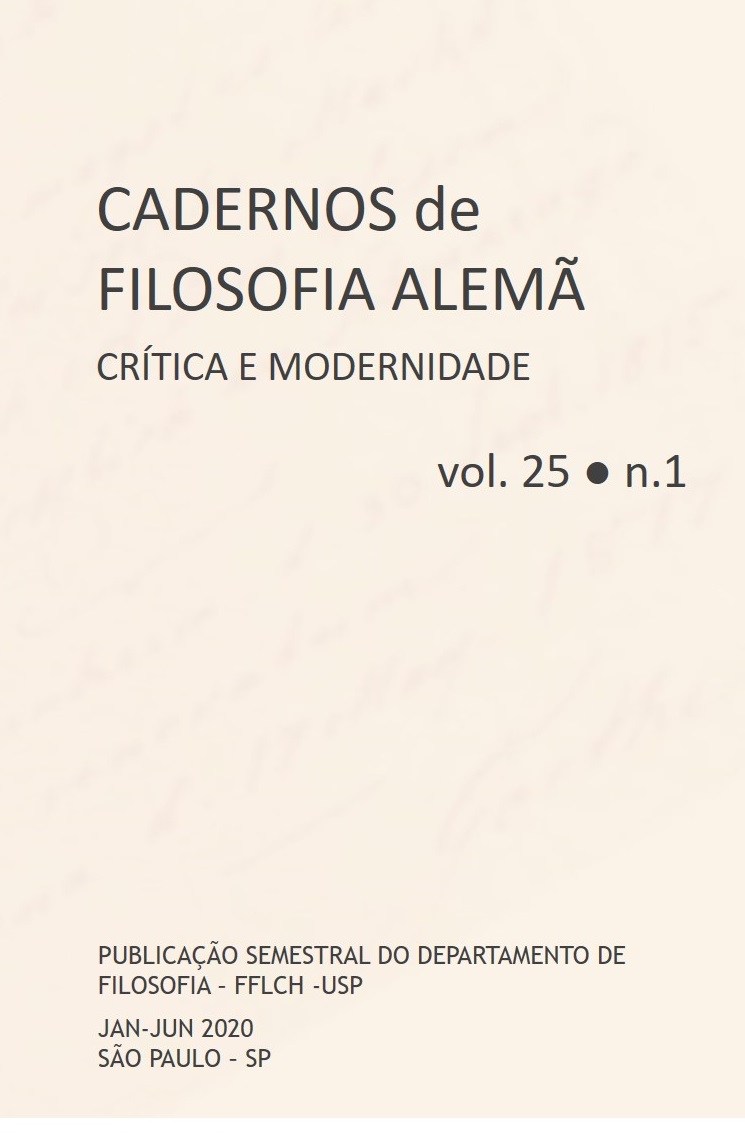Anticapital para o século XXI (sobre a metacrise do capitalismo e as possibilidades abertas para a política radical)
DOI:
https://doi.org/10.11606/issn.2318-9800.v25i1p149-163Keywords:
capitalismo, crise, democracia, emancipação, hegemonia, marxismo, neoliberalismo, política radicalAbstract
Using the temperate nature of recent social protest as its entry point, this analysis investigates the current state of liberal democracies as one in which the purported crisis of capitalism has entered a crisis of its own – a social condition of metacrisis, marked by the absence of utopian energies and prospects for a revolution, even as society experiences itself in perpetual crisis. This inquiry then discerns the potential for radical change in terms of subverting capitalism (rather than overthrowing or resisting it) through practices that counteract the very constitutive dynamic of capitalism – the production of profit.
Downloads
References
Apostolidis, P. (2018). The fight for time: migrant day laborers and the politics of precarity. Oxford: Oxford University Press.
Azmanova, A. (2011a). Against the politics of fear: on deliberation, inclusion, and the political economy of trust. Philosophy and Social Criticism, 37 (2), pp. 401-12.
Azmanova, A. (2011b). After the left-right (dis)continuum: globalization and the remaking of Europe’s ideological geography. International Political Sociology, 5 (4), pp. 384-407.
Azmanova, A. (2012). The scandal of reason: a critical theory of political judgment. New York: Columbia University Press.
Azmanova, A. (2014). Crisis? capitalism is doing very well. How is critical theory? Constellations: an International Journal of Critical and Democratic Theory, 21 (3), pp. 351-65.
Azmanova, A. (2018a). The populist catharsis: on the revival of the political. Philosophy and Social Criticism, 44 (4), pp. 399-411.
Azmanova, A. (2018b). Relational, structural and systemic forms of power: the “right to justification” confronting three types of domination. Journal of Political Power, 11 (1), pp. 68-78.
Azmanova, A. (2019). The emancipation paradox: populism, democracy, and the soul of the left. Philosophy and Social Criticism, 45 (9-10), pp. 1186-207.
Azmanova, A. (2020). Capitalism on edge. How fighting precarity can achieve radical change without crisis or utopia. New York: Columbia University Press.
Butler, J. (2004). Precarious life: the powers of mourning and violence. New York: Verso.
Dean, J. (2009). Democracy and other neoliberal fantasies: communicative capitalism and left politics. Durham: Duke University Press.
Della Porta, D., Hänninen, S., Siisiäinen, M., & Silvasti, T. (2015). The precarization effect. In _____ (Orgs.), The new social division: making and unmaking precariousness (pp. 1-23). London: Palgrave Macmillan.
Derrida, J. (2002 [1983]). Economies of the crisis. In Rottenberg, E. (Org.), Negotiations: interventions and interviews, 1971–2001 (pp. 69-73). Translated by Elizabeth Rottenberg. Stanford: Stanford University Press.
Fraser, N. (2017a). Against progressive neoliberalism, a new progressive populism. Dissent. Recuperado de: https://www.dissentmagazine.org/online_articles/nancy-fraser-against-progressive-neoliberalism-progressive-populism. Acesso em: 9 abr. 2020.
Fraser, N. (2017b). The end of progressive neoliberalism. Dissent. Recuperado de: https://www.dissentmagazine.org/online_articles/progressive-neoliberalism-reactionary-populism-nancy-fraser. Acesso em: 9 abr. 2020.
Fromm, E. (1941). Escape from freedom. New York: Farrar and Rinehart.
Habermas, J. (1991 [1984]). The new obscurity: the crisis of the welfare state and the exhaustion of utopian energies. In Nicholsen, S. W. (Ed.), The new conservatism. Cultural criticism and the historians’ debate (pp. 48-70). Translated by Shierry Weber Nicholsen. Cambridge: MIT Press.
Kant, I. (1967). Philosophical correspondence 1759-99. Edited and translated by Arnulf Zweig. Chicago: University of Chicago Press.
Kant, I. (2007 [1781]). Critique of pure reason. 2nd rev. ed. Translated by Norman Kemp Smith. New York: Palgrave Macmillan.
Mouffe, C. (2018). For a left populism. London: Verso.
Mouffe, C., & Laclau, E. (1985). Hegemony and socialist strategy. London: Verso.
Odendahl, C. (2017). The Hartz myth. A closer look at Germany’s labour market reforms. London: Centre for European Reform. Recuperado de: https://www.cer.eu/sites/default/files/pbrief_german_labour_19.7.17.pdf. Acesso em: 9 abr. 2020.
Price, J. J. (2001). Thucydides and internal war. Cambridge: Cambridge University Press.
Rhodes, M. (2001). The political economy of social pacts: competitive corporatism and European welfare reform. In Pierson, P. (Ed.), The new politics of the welfare state (pp. 165-94). Oxford: Oxford University Press.
Standing, G. (2011). The precariat: the new dangerous class. London: Bloomsbury.
Streeck, W. (1984). Neo-corporatist industrial relations and the economic crisis in West Germany. In Goldthorpe, J. H. (Ed.), Order and conflict in contemporary capitalism (pp. 291-314). Oxford: Oxford University Press.
Wright, E. O. (2019). How to be an anticapitalist in the twenty-first century. New York: Verso.
Downloads
Published
Issue
Section
License
Information and conceptions on the texts are complete responsibility of the authors.
All the articles submitted before July 5th 2018 and those published after July 2021 are licensed under a CC BY-NC-ND license – except those published between the aforementioned dates, which are under the CC BY-NC-SA license. The permission for the translation of the material published under the license CC BY-NC-ND by third parts can be obtained with the consent of the author.
Open access policies - Diadorim
Rules applied before July 5th 2018:
Presenting a submission to our Editorial Board implies granting priority of publication for “Cadernos de filosofia alemã”, as well as transferring the copyright of texts (once published), which will be reproduced only with the manifest authorization of the editors. Authors keep the right to reuse the texts published in future editions of their work, without paying any fees to "Cadernos”. We will not grant the permission to re-edit or translate the texts for third parts without agreement of the author.


